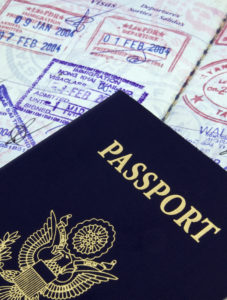 The consular process of immigrant visas is the process where a noncitizen wishing to immigrate to the United States goes to a U.S. embassy or consulate in his or her home country to apply for an immigrant visa. Those living in the U.S. with a valid immigration status often do not have to use the consular process, as they generally are eligible for Adjustment of Status.
The consular process of immigrant visas is the process where a noncitizen wishing to immigrate to the United States goes to a U.S. embassy or consulate in his or her home country to apply for an immigrant visa. Those living in the U.S. with a valid immigration status often do not have to use the consular process, as they generally are eligible for Adjustment of Status.
Many find the consular process to be headache inducing. The process involves working with two federal agencies, following rules that are not uniform, and waiting in lengthy lines. In this article, we take a broad look at the consular process.
Consular Process: The Basics
Before obtaining an immigrant visa, a noncitizen wishing to immigrate to the United States must obtain an approved immigrant visa petition. While there are many ways to immigrate to the U.S., most petitions are filed either by family members or by employers.
When the U.S. Citizenship and Immigration Services (USCIS) approves the immigrant visa petition, it sends notice to the U.S. State Department. When an immigrant visa is available in the category in which the petition was approved, the State Department schedules an interview at the embassy or consulate in the noncitizens home country.
Before the Interview
The paperwork and legal logistics leading up to the consular interview can be maddening. Because each embassy or consulate follows its own procedures, it is difficult to generalize the steps involved in the lead-up to the interview.
After the USCIS approves the immigrant visa petition, notice is sent to the National Visa Center (NVC). Prior to sending the approved visa petition to the appropriate consulate so that an interview may be scheduled, the NVC sends a bill to cover the cost of visa processing. This provides the petitioner an opportunity to indicate that he or she wishes to continue with the immigrant visa process.
After the NVC forwards the approved petition to the consulate for visa processing, both the petitioner and the noncitizen will be required to complete additional forms. The noncitizen will also have to undergo a medical exam. Then, depending on which embassy or consulate will conduct the interview, the petitioner and noncitizen must take additional steps that are unique to the specific embassy or consulate.
If this process sounds confusing, it is. Many petitioners and noncitizens find it difficult to navigate the intricacies of consular processing, and they find little help from immigration or visa issuing authorities. For this reason, many choose to hire an attorney to assist them with the consular process.
Because of our extensive consular practice, the George McCranie Law Firm has access to unpublished contact information, unique consular processes, and liaisons, providing us with valuable resources for assisting our clients in obtaining immigrant visas abroad.
At the Interview
Once the consular interview is finally scheduled, attending it is straightforward. The visa officer will review the immigrant visa application and ask questions related to the noncitizen’s admissibility to the U.S. Foreign nationals may be inadmissible for a variety of reasons including health, immigration history, criminal infractions, and character. It is important to discuss any potential issues with an experienced immigration attorney prior to attending a consular interview. A determination of inadmissibility carries with it wide-ranging immigration consequences that may be difficult or impossible to overcome.
Due to security reasons, immigrant visas are not issued on the spot at the consular interview. Instead, the noncitizen is required to return to the embassy or consulate later to pick up the immigrant visa, which will be printed inside the passport.
Caution: Triggering the Bar
Immigrants who are living in the United States without valid immigration status (and are thus ineligible for Adjustment of Status) will receive a notice for the consular process after the approval of an immigrant visa petition. Upon departing the U.S., any intending immigrant who has been unlawfully present for 180 days or more will trigger a bar to reentering the U.S. – even if the departure was to attend a scheduled consular processing interview.
To Learn More About the Consular Process
As such, anyone who is in the U.S. without valid immigration status should discuss all immigration options with a qualified, experienced immigration attorney. At the George McCranie Law Firm, we represent clients from all around the world in a variety of immigration matters. Whether you are seeking a nonimmigrant visa, a green card, or resolution of your immigration issue, we are here to help. Call our team at the George McCranie Law Firm today, at 912-383-7581, to help you bring your loved one to the United States. We prepare and process all necessary documentation. We are in constant communication with U.S. Consulates and Embassies overseas to facilitate a successful outcome.
